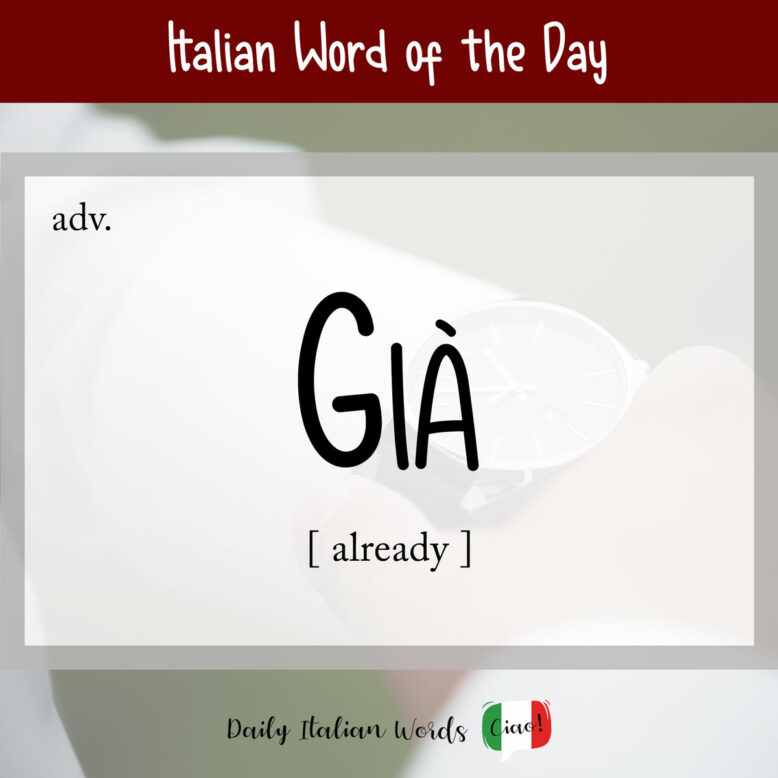Out of all the small and widely used adverbs in Italian, già is undoubtedly one of the most important. Its most frequent translation in English is already and it comes from the Latin word iam of the same meaning.
già
already

It is mostly used with the passato prossimo tense, appearing between the auxiliary verb and the past participle (e.g. ho già mangiato = I’ve already eaten).
Già is pronounced as one syllable (“jah”), not two separate syllable (“ji-ah”). Note that in Italian, the vast majority of monosyllabic words concluding with two vowels are marked with a grave accent on the second vowel, provided that it has a truncated sound. Some other examples include ciò (that), giù (down) and più (more).
Ho già letto questo libro. Ne hai un altro?
I’ve already read this book. Do you have another one?
Di già? is a frequently heard expression in Italian, used when something happens sooner than expected. In English, we would usually say something similar to “What, already?” or “What, so soon?“
Mi dispiace, ma devo andare. – Di già?
Sorry, but I have to go. – What, already?

Già can also be translated as yet and before when they can be replaced by already without a drastic change in meaning. For example:
- Hai già visto il nuovo film di Scorsese? = Have you seen Scorsese’s new film yet? (or Have you already seen Scorsese‘s new film?)
- Te l’ho già detto mille volte. = I’ve told you a thousand times before. (or I’ve already told you a thousand times.)
Sono già arrivati i tuoi genitori? – No, sono in ritardo.
Have your parents arrived yet? – No, they’re late.
(Another possible translation: “Have your parents already arrived?”)
Sei già stato a Firenze?
Have you been to Florence before?
(Another possible translation: “Have you already been to Florence?”)
Yet another meaning is even, as in the following examples:
- Già da bambina, voleva diventare una ballerina. = Even as a little girl, she wanted to be a dancer.
- Già nei tempi antichi, il cioccolato era considerato cibo per privilegiati. = Even in ancient times, chocolate was considered a food for the privileged.
When written as one word giacché, it serves as a conjunction meaning “since” in Italian. It carries a more formal and literary tone compared to other, more casual synonyms like siccome, dato che, and visto che.
Giacché non potete venire sabato, abbiamo deciso di spostare l’appuntamento a domenica.
Since you cannot come on Saturday, we have decided to change the date to Sunday.
Già che, written as two words, does appear in a few informal set phrases, namely:
- Già che ci sei/ci siamo… = While you’re/we’re at it… (literally “since you’re/we’re here”) – also While we’re on the subject… / Speaking of which…
- Già che sei in piedi… = Since you’re up… (literally “since you’re on your feet”)
- Già che siamo in ballo, balliamo = We have to get through this now that we’ve started (literally “now that we’re dancing, let’s dance”)
Già che ci sei, prendi anche un po’ di frutta.
While you’re at it, pick up some fruit as well.

In colloquial Italian, già is also frequently employed to confirm a prior statement, often (but not always) with a bitter, sarcastic or annoyed tone of voice. It may be preceded by the interjection eh. Potential English equivalents include yeah, yep/yup, of course, that’s right, or indeed.
È lui il nuovo allenatore? – Eh, già.
Is he the new coach? – Yup.
To conclude, già can mean former or ex and is used in front of nouns and adjectives.
- Giorgio Napolitano, già presidente della Repubblica = Giorgio Napolitano, former President of the Republic
Heather Broster is a graduate with honours in linguistics from the University of Western Ontario. She is an aspiring polyglot, proficient in English and Italian, as well as Japanese, Welsh, and French to varying degrees of fluency. Originally from Toronto, Heather has resided in various countries, notably Italy for a period of six years. Her primary focus lies in the fields of language acquisition, education, and bilingual instruction.


